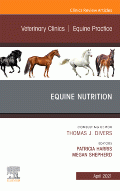Urschel Co-Authors Nutritional Influences on Skeletal Muscle & Muscular Disease Review
 Kristine Urschel, PhD, an associate professor in the University of Kentucky’s Department of Animal and Food Sciences, in conjunction with colleague Erica McKenzie, BVMS, PhD, DACVIM, DACVSMR, professor in the Department of Clinical Sciences at the Carlson College of Veterinary Medicine, Oregon State University, recently co-published a review paper titled, “Nutritional Influences on Skeletal Muscle and Muscular Disease,” in the April issue of the Veterinary Clinics of North America: Equine Practice.
Kristine Urschel, PhD, an associate professor in the University of Kentucky’s Department of Animal and Food Sciences, in conjunction with colleague Erica McKenzie, BVMS, PhD, DACVIM, DACVSMR, professor in the Department of Clinical Sciences at the Carlson College of Veterinary Medicine, Oregon State University, recently co-published a review paper titled, “Nutritional Influences on Skeletal Muscle and Muscular Disease,” in the April issue of the Veterinary Clinics of North America: Equine Practice.
According to Urschel and McKenzie, proper nutritional management is necessary for the growth and maintenance of muscle mass, to support muscle contraction, to promote muscle recovery following exercise and in the management and prevention of muscular disorders. Key nutrients needed to support muscle include protein, carbohydrates, fat, vitamin E and selenium.
In the review, the authors stated that appropriate nutritional management is essential to the development and maintenance of healthy skeletal muscle throughout the lifespan of a horse. Energy is necessary to support muscle growth, maintenance and activity. Provision of adequate high-quality protein is critical because protein is the major non water component of skeletal muscle. Muscle mass can decrease with age as the tissue becomes less sensitive to the anabolic stimuli, and nutritional interventions to prevent this phenomenon are not known for horses. Similarly, feeding protocols that might optimize post-exercise muscle protein synthesis and glycogen repletion in horses have yet to be defined.
Horses are prone to several heritable muscular disorders that can be successfully managed by restricting nonstructural carbohydrate (NSC) intake for most disorders, or dietary potassium intake for HYPP. Vitamin E and selenium deficiency also remain important causes of muscular disease in horses and deserve appropriate attention in balanced feeding plans.
The paper overviews muscle fiber structure and physiology, the regulation of muscle protein synthesis, primary fuel sources and metabolism, protein and energy for muscle growth and maintenance, muscle in aged horses, muscle ergogenic supplements and muscular disorders influenced by nutrition.
The review can be found online at https://www.sciencedirect.com/science/article/pii/S0749073920300729?dgcid=author
Holly Wiemers, MA, APR, is communications and managing director for UK Ag Equine Programs.
